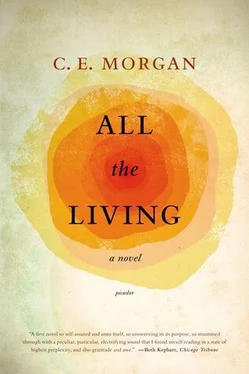When she trailed out to the tractor in the afternoon, taking his lunch to him so he would not have to walk in, she hymned as she walked and paced her expirations to the tempo of her feet. Orren would take the food and say thank you and never comment on her newborn singing, only eat quickly and continue on with his day, which was the fertilizing and the watering, fingering the plants with a consternation that grew as he eyed the sky and checked the weather on the radio that he kept on his tractor. He moved now with what had always been the edgy promise of his body. If he said anything at all, it was, It better goddamn rain, or as he did one time, just turning his face up to the sky and charging it with a look of hate and questioning, both.
Orren, she had said then, disapproving. And she looked around as if there were actually someone there to witness his spite, but it was just the two of them and the blue tractor and the barely budded plants and beyond them the buckled ridge of the mountains with its late greens. Orren looked down at her dully for a moment, but she stood her ground against his unnearable gaze and she inspected him. The cap pulled low, deep oval stains of dirt on his thighs and knees, and between his fingers, the ever-present white stalk of a cigarette. None of these things described a change in him, but she wondered when she had last seen him smile. She could not remember, she gave up. There was no point to remembering anymore. She only wanted Orren back, but she was no longer sure that even the rain would bring that.
On Wednesday, after the merest drizzle the night before, they woke to a whitened field. Aloma came down the steps first and almost dropped her coffee mug for the shock of it when she turned in her nightgown and saw the field of green topped with fists of irregular branched flowers, as white as the gown that swirled around her hips and legs when she turned. Orren, she called, but he was silent, still upstairs, and she slipped her bare feet into his work boots, felt the grime and deep press of his wide feet so that she felt herself for a moment to be standing in him, then half ran down the slope in the cool near-morning. The sun had not yet breached the ridge and the light of the air was white overhead, thin and unfinished, yet the coming morning burned a single thin fire line on the black ridgetop, it distended and filled like a blister with the blood of the morning even as she watched. The western fall of the ridge was black, black as its eastern side collected the rising light. The shadowed ridge crested high over the field as she ran down past the willow, its withes bowed oblivious in the still air, to the edge of the field and she stood there to catch her breath. The white bunched blossoms had breasted out of their buds overnight, coming in darkness into sudden blooms the color of morning. They massed in whiteness before her, they topped the bruised and weathered plants. The sky marshaled, deepened even as she stood there breathing and watching in wonder, it lightened as she stepped into the first row, reaching out to find a branched blossom with her open hand, the way it spread orderless and fresh over the uncomely, sticky-haired working tobacco leaves. The dirt under her feet breathed figments of fine dust as the soles of Orren’s boots pressed against it. Any rain of the previous evening had come and gone, as insubstantial as dew, and the soil was dry again. Aloma turned around then, and with her hand still raised to the white tongue petals chest high, she looked back at the house silhouetted against the fading dusk of the night sky. Orren stood in the door, her abandoned coffee cup in his hand. Aloma withdrew her hand from the blossom and returned it to her side. For a long moment she contemplated his figure and the effort required to walk back up the hill and then she succumbed, she left the white field and went to him. The first orange sunray burned the eaves of the house as she stepped beneath it. In a moment, it would burn the white of her gown.
That’s a mess of topping, Orren said when she drew close enough to hear. That’s my task today.
What?
Top that whole field. Succor soon enough.
Aw, she said, childlike, standing beside him and turning so they both looked out over the brightening field. Both their lips twisted down to the far sides of their faces.
Can’t you leave it be just a little while? she said.
Not less you want to starve.
Well, say what you mean, Orren. She sighed.
He blinked at her in surprise a moment, then cleared his throat and said quietly, We was raised to speak our minds. Mama didn’t want no middling boys.
Aloma said nothing in return, only turned to stare balefully out at the field again and he followed her gaze. It is pretty, he conceded.
White as Christmas.
Let’s just make it to the real Christmas.
I never had anybody to do Christmas, she said suddenly.
Well, I don’t got nobody my own self, he said, and as the unintended weight of his words settled on her, she looked at him pointedly so that he couldn’t help but see his own mistake and he said promptly, Now, I ain’t meant it like that. But she was already moving past him into the house and she didn’t see that he turned quickly and followed her jagged movements with his eyes. She kept her back to him, tucked her chin into her neck, cracking eggs in a bowl and refusing to look back at the fields or at him. She did not want to see him against the burst of white. In a few short minutes, the smell of bacon frying drew him slowly in from where he stood sentinel on the steps. He stepped beside her to pour black coffee into his mug, though he didn’t try to say anything else, he moved gentler than his weight accorded. He let her ignore him. Then he took a full plate of food and headed out without a word.
All day he kept to the fields and Aloma watched from the kitchen door as row after row of tobacco plants was shed of its white. She tried to persuade herself to work in the house, but she was driftless, bored with herself, drawn repeatedly against her will to her post at the back door where she monitored the topping. And her spirit fell by increments as the blossoms went to the dust. She picked at her nails, she sweated in the doorway, Orren moved plant to plant under the sun.
When the phone rang in the middle afternoon, she couldn’t say how long she had been standing there, squinting into the field, waiting for something to force her away. She recognized Bell’s voice right away from its depth, its dark and pleasing pitch.
We won’t be needing you tonight, he said and she felt a keening disappointment, wrapped the phone cord around one finger and said, But could I still come? He laughed then, saying, Well sure, of course. I’d not stand in the way of a woman who wants church. So she wandered down past the willow onto the plowed lip of the field where she called out a lie to Orren, said she was needed to play at the church and then she left him where he stood half-turned to hear her with a knife in one hand and sweating in the deepening heat.
In the church, she made a point to sit in the back row where this time she could cast her eyes about, freed from the gaze of others, freed from the piano. Bell wore jeans on this hot night and a short-sleeved shirt and she saw sweat rings in the blue shirt so sheer it was almost white. He towered over everyone else in the church and he drew a gaze by virtue of his height, she wondered if he knew and liked that. He grinned easily at everyone and, because it was Wednesday, spoke loosely as though he were in his own home. Three men led the singing, each with a rosewood dreadnought worn paper-thin where the pickguards once had been, and everyone knew the songs and Aloma did too, not because she had sung them in the school — they’d been disallowed there — but because they’d been bred into her in a time long before school, though they’d been long buried like a seam. She sang softly at first, almost afraid to make her presence known in the church where she felt she did not belong, but then she sang out and by the end of the two hours, that feeling had returned again, the one she’d felt on Sunday morning, a feeling that had nothing to do with God or not God, but only with a sound risen on her breath. She would have felt it if she’d sung in a field or a kitchen or a bed, and she felt it in a church just the same.
Читать дальше
Конец ознакомительного отрывка
Купить книгу











